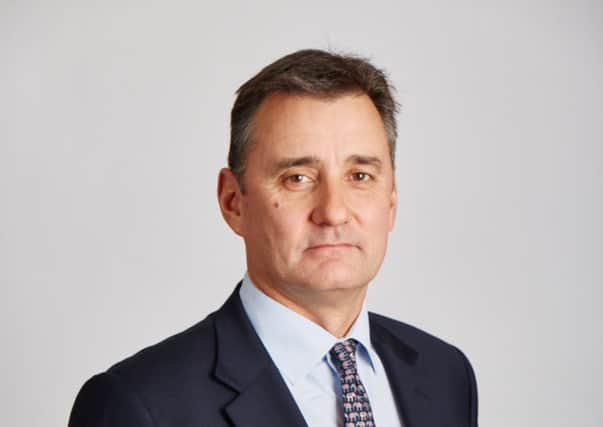Monday interview: Brett Simpson, chief executive of Low & Bonar


Dundee was once famed for jam, jute and journalism. But from virtually the beginning of the 20th century it also became known for the company Low & Bonar, which built a highly successful yarns, fibres and fabrics business covering a multitude of applications. Its polymer-created products can be found in textiles that go into the ground to modify its use, perhaps for stabilising a railtrack; the backs for carpet tiles in commercial workspaces; and tarpaulins and car mats.
Nothing stands still, however, and Low & Bonar chief executive Brett Simpson, in charge since 2014, has a clear vision. “We are increasingly a solutions-provider, we are not in the commodities business,” he says. “We are now focused on working with designers and engineers to have our products brought into their production. It also derives a higher profit margin.”
Advertisement
Hide AdAdvertisement
Hide AdA key strategy of Simpson is to expand Low & Bonar from its core market of mainland Europe, accounting for about 60 per cent of group sales, into fast-growing markets.
He is interested in the potential of China, where the group opened its first factory early this year after having had a small joint venture, and the potential for getting a slice of the considerable infrastructure work that North America (17 per cent of sales) needs.
Simpson says the new plant at Changzhou was expected to reach full capacity by end-2017, generating sales of £30 million a year. A second phase is now being built, doubling capacity by early 2018, with total Chinese investment of £52m.
The Low & Bonar boss stresses that the British group – which still employs 50 at its remaining business in Dundee making carpet-backing – was not going to China to take advantage of it being the “world’s factory”, but rather to ride rising local consumption.
Simpson says: “We are supporting our US customers who are building for local demand. They have seen the opportunity in China and built their own facilities. We have supported their business growth through imports for a period. We are now extremely proud to have taken that further.”
He also believes the business can benefit from increasing urbanisation in China, “with a growing middle class moving into improved housing. There’s a shift of population to the city centres, and our products are following them”.
Low & Bonar’s end-users range from civil engineering and flooring to building products, transport and industrial businesses. Simpson says Europe “is and will remain a very strong area for us, but will become a part of a bigger pie. We just want to leverage our product portfolio here elsewhere”. He is also cool on the UK’s Brexit vote, given the company only has 6 per cent of sales here. “We are mainly a euro/dollar business.”
Low & Bonar’s strength is that it is normally the number one or two player in the niche markets it operates in, and that the strength of its brands and its product reliability provides additional barriers to entry.
Advertisement
Hide AdAdvertisement
Hide AdBroker Peel Hunt says: “Its products typically constitute only a very small percentage of the end-customer’s costs, yet are key to the functional performance of the end product/construction.”Even so, Low & Bonar, which reports its year-end results next month, has seen its shares underperform the FTSE all-share, FTSE industrials and FTSE construction & building materials indexes by significant double digits this year. Simpson shrugs it off, saying: “I am very happy with the strategy we have in place and the progress we are making.”
He adds that he wants operations that can get “a 10 per cent return on sales and 12 per cent on capital employed”. He has just sold the Grass Yarns business aimed at the sports and leisure industries for £27m because although its low margins improved over the past two years, “we knew it was not going to get to 10 per cent”.
He says “portfolio-management” remains ongoing, but indicates that any acquisitions are likely to be “bolt-on” given the strong potential for internally-generated growth. “Acquisitions are no more than one of the levers we can use, we would only consider them if they give us access to a core market, a new technology and be accretive in terms of underlying earnings,” he adds.
Low & Bonar, even with the odd “speed bump” of issues with production and scheduling at its coated technical textiles business in the first half of 2016, seems to have a clear view of the road ahead.
30-second CV
Born: 1964, Auckland, NZ, but grew up in Melbourne, Australia
Education: Burwood High School, Melbourne; Monash University, Melbourne, Australia; MBA at Columbia University, New York.
What did you want to be at school?: Jet fighter pilot
What was your first job?: Production engineer, The Dow Chemical Company
Best piece of business advice ever given to you: When working across cultures, “it’s not necessarily wrong, it’s just different”.
Car: BMW
Book or Kindle: Kindle
Advertisement
Hide AdAdvertisement
Hide AdWhat couldn’t you live without?: Physical exercise and sport
Favourite holiday destination: Anywhere where the waves are breaking. I grew up surfing.
Best thing about your job: the variety of challenges and opportunities. I get tremendous energy from mentoring and stretching people.